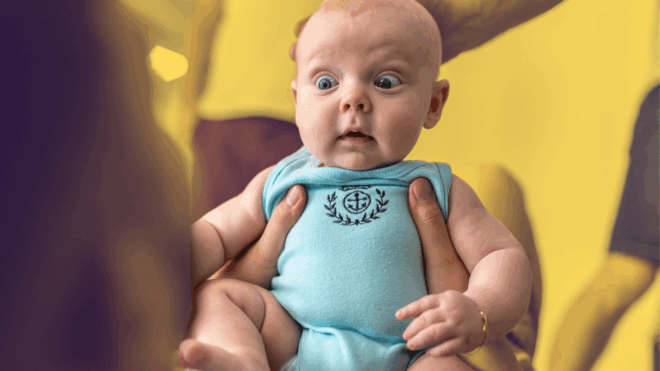Today, one in every 68 children is diagnosed with autism, and Betty Crea Davidson, a lawyer living in Westchester, New York, was devastated when her 2-year-old son became one of them in 2004. While there is no cure for autism, she became determined to find the best treatment possible for her son. Three hard years later, Davidson had achieved an astounding feat: Atticus had improved so much, doctors say he no longer has the condition. While Davidson is the first to say that what worked for her won't work for everyone, she wants to share what she's learned in the hopes that some parents can follow in her footsteps. Here is her story:
How did you find out your son had autism?
Atticus has a twin brother named Eddie, and early on they hit most of their developmental milestones within days of each other, from rolling over to standing to walking. Then around the age of 2, Eddie started talking while Atticus skewed off into a weird place. He'd roll his toys back and forth or line them up. After mentioning this behavior during a well visit, I was referred to a specialist. After observing Atticus in his office, he said, "His play is not normal." That's when the first stirrings of panic wadded up in me. "I don't want to use the word 'autism' because you'll have these visions of a kid rocking in a corner," the doctor continued. "But he has autism." With further tests I was told that Atticus had scored below the first percentile across every domain, from language to social intelligence. So nobody was worse off than my son. I was too shocked to cry until I got home. Then in the driveway I lost my mind.
__How devastating! What treatment options did you have? __
Doctors recommended Applied Behavior Analysis, or ABA. Being a lawyer, I assumed they were referring to the American Bar Association! But ABA is the only method proven to be effective in treating some of the core deficits of autism. Only problem is, there's no requirement that a person practicing ABA needs be certified or trained. Anyone can attend a workshop, hang up a shingle, and say they're an ABA therapist. Since my son's life was too important to leave up to chance, I decided that I'd become his ABA therapist, reading everything I could get my hands on and training with doctors across the country.
So what would you do during your typical therapy session?
Kids with autism need to not only learn what things are, but their context. So for instance, I'd show him a picture of a dog and ask him to name it "dog." Then we'd move on to understanding other things about the dog, like the fact that it barks and has a tail. From there, I might reverse it by asking, "What animal barks and has a tail?" or ask, "How is a dog similar to a cat? How are they different?" To help him learn how to communicate, I tried to find out what would motivate him. For instance, Atticus could eat his weight in blueberries. So I'd show him one and say "blueberry"? and would give it to him once he repeated the word, although for him it was "booberry." A normal child might connect the dots in one or two tries. But with Atticus it took hundreds of repetitions. I pretty much quit my law practice to focus on saving my son full-time. My savings evaporated; I joked that my bank account was an urban legend.
So when did you start noticing progress?
The first year was slow. Atticus was not easy to teach; it took him two months to just sit in a chair and pay attention. It was so hard to watch Atticus cry during therapy and not just scoop him up in my arms. But I'd tell myself, "Better he cries at 4 than I'm crying when he's 40 and still taking care of him." Then one night I was home with my three kids, trying to piece together an IKEA book case with 2,000 screws. I asked my kids, "Can someone turn on the light?" I expected my older daughter Vivian or Atticus's brother Eddie to do it. But Atticus was the one who turned on the light. It was the first time I'd ever seen him respond to a request. I started bawling so hard, my daughter thought I'd hurt myself with the screwdriver.
Wow! So what did doctors have to say about Atticus's progress?
They were so baffled, they went back and re-watched the videos they'd originally taken of him, assuming they must have made a mistake in his diagnosis. At the age of 5, Atticus became a medically documented case of complete recovery. Atticus was able to attend kindergarten like any other boy his age. Today, he has friends, a great sense of humor, average or above average grades, and is just a typical kid. You know how so many parents wish their child were exceptional, atypical? I think, "Yay! I have a typical kid!"
More from The Stir: Mom Says She's Found Autism Cure: Would You Try It?
What advice would you have for other parents whose kids have autism?
I've tried to distill my approach to ABA in a computer course, ApexSpectrumGuide.com, so that other parents can try this method. Yet I'd never been so cavalier to say, "Hey, if you do what I did, then your child will recover too." Still, what I can say is that when a child receives the right therapy for the right amount of time, they are going to make progress. The other thing I'd say is that parents should do what makes intellectual and not emotional sense. I've been guilty of trying some "alternative" autism therapies like massage. But if it's appealing to your heartstrings but intellectually you're thinking, "Come on, how is massage or mega-dosing on vitamin D going to cure autism?" don't do it. Not a week goes by without a parent contacting me asking, "What should I do?" I think more of them need to know that these great outcomes are possible.
Do you think it's possible to "beat" autism?
Image via Betty Crea Davidson




